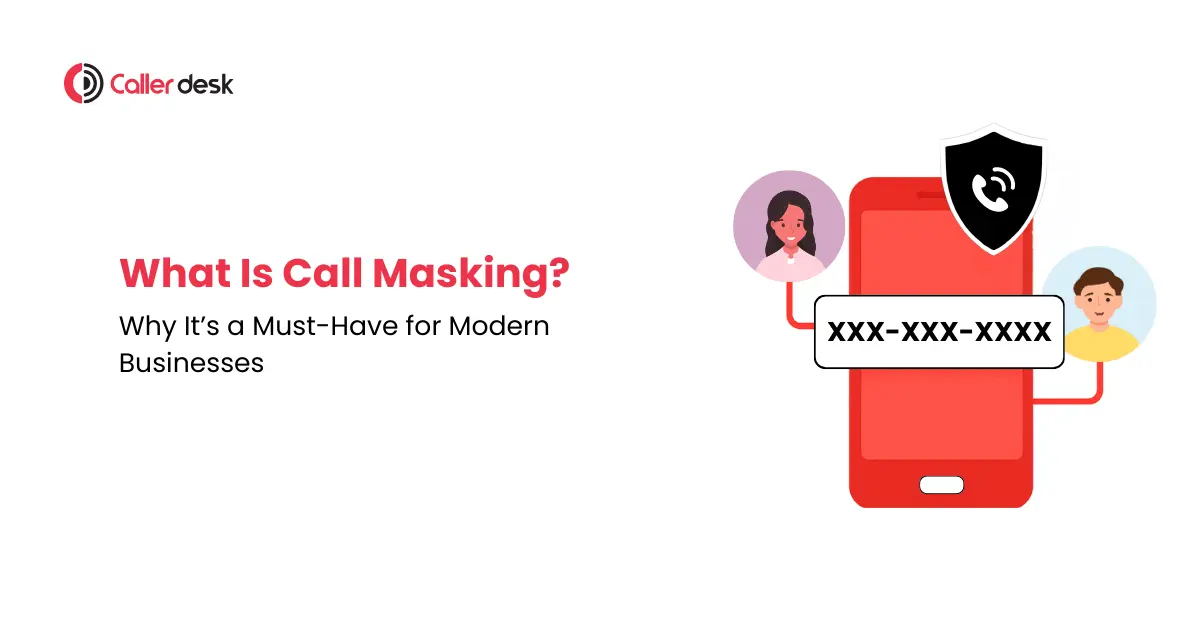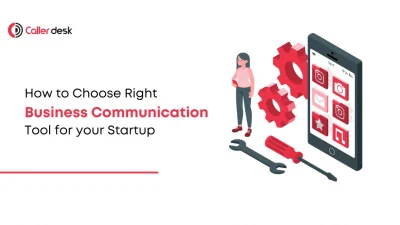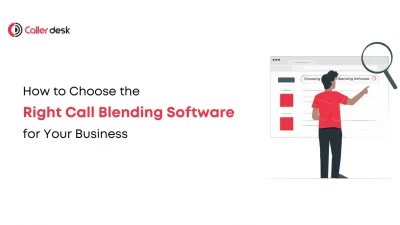In many businesses, calls happen every day between customers and staff — whether it’s delivery agents, drivers, support teams, or field executives. But when these calls happen using personal mobile numbers, it creates a serious privacy problem.
- 1 Call Masking Meaning: What It Actually Does
- 2 How Phone Number Masking Works
- 3 Why Call Masking Is Becoming Standard in Indian Businesses
- 4 Top Benefits of Using Call Masking Software
- 5 Where Is Caller Number Masking Used?
- 6 Choosing the Right Call Masking Solution
- 7 Conclusion
- 8 Frequently Asked Question
Customers don’t feel safe. Agents receive unwanted callbacks. And businesses lose control over how communication happens.
This is where caller number masking helps.
Also known as call masking or phone number masking, it’s a method used by companies to hide real phone numbers during business calls. Instead of showing the original numbers, the system connects both sides using a temporary masked number — which expires after the call ends.
This blog will explain what call masking means, how number masking works, why it’s widely used in India, and how businesses are using masked calling to protect privacy, avoid misuse, and build customer trust.
Call Masking Meaning: What It Actually Does
Most businesses know they should protect customer data. But many ignore the simplest leak: exposed phone numbers.
Call masking, also known as caller number masking, hides the real mobile numbers of both the caller and receiver during a phone call. Instead of using actual numbers, the call is routed through a temporary virtual number.
So when your delivery guy calls a customer, or a support agent talks to a lead:
- They connect instantly
- They speak normally
- But neither sees the other’s actual number
Once the call ends, the masked number expires. No tracking, no follow-up calls, no risk.
This is what phone number masking really means — and why it’s essential.
How Phone Number Masking Works
Phone number masking is a technique that hides personal phone numbers during a call. It uses a virtual number to connect the caller and receiver without exposing their real contact details.
Here’s a clear phone number masking example to explain how it works:
- A call is triggered — for example, a delivery agent needs to call a customer.
- Instead of calling directly, the system (like CallerDesk’s call masking software) generates a temporary virtual number.
- This number acts as a bridge. Both the agent and customer are connected through it.
- On both sides, the call appears to be from this virtual number — the real phone numbers stay hidden.
- Once the call ends, the masked number becomes inactive. It cannot be used again for further contact.
This entire process is handled automatically by the phone number masking service. No manual input is required. The system ensures that every call is private, secure, and logged — without exposing personal contact details.
Businesses in India are using call masking to manage delivery calls, appointment confirmations, driver-customer coordination, and field service communication — all while keeping user data protected.
Why Call Masking Is Becoming Standard in Indian Businesses
Here’s the hard truth: most businesses operating without call masking are risking more than they realize.
You’re risking:
- Customer trust when you expose their phone numbers
- Brand image when agents call from unknown numbers
- Legal issues when data privacy is ignored
- Unwanted callbacks after service ends
- Zero control over agent-customer conversations
Top businesses across India are already switching to call masking solutions because it gives them control, compliance, and customer confidence — without changing how their teams work.
If you operate in India, using a call masking software that complies with DLT and local telecom guidelines isn’t just smart. It’s responsible.
Top Benefits of Using Call Masking Software
Call masking is no longer a niche security feature — it’s becoming a core requirement for businesses that rely on voice communication. Here’s why more businesses are switching to number masking solutions:
1. End-to-End Privacy for Customers and Agents
When a call is routed through a masked virtual number, both the caller and the receiver remain anonymous. This ensures full privacy on both ends, helping businesses avoid data misuse, unwanted follow-ups, and potential legal issues related to personal data exposure.
2. Automatically Prevent Post-Service Calls
Without masking, customers can call your agents back anytime — even after the delivery or service ends.
Call masking software solves this by allowing you to set expiry rules for virtual numbers. Once the defined session or time window is over, the masked number stops working — making unwanted callbacks impossible.
3. Centralized and Professional Communication
Instead of agents using personal SIM cards, all calls are made through company-assigned virtual numbers. This ensures:
- Standardized caller IDs
- Branded and professional interaction
- Better internal accountability
You maintain complete control over who is calling whom, when, and why.
4. Real-Time Call Monitoring and Tracking
Every masked call can be:
- Logged
- Tracked by timestamp
- Monitored in real-time
- And optionally recorded for quality or dispute resolution
This gives businesses visibility across all communication — without compromising privacy.
5. Fast Deployment, Easy Scalability
Modern call masking solutions can be deployed without hardware. Whether you use an app, CRM, or web dashboard, masking can be activated through APIs or simple configuration.
You can start with 5 agents and scale to 5,000 — no infrastructure upgrade required.
Where Is Caller Number Masking Used?
Anywhere there’s a phone call between a business and a customer — call masking applies.
Here’s where number masking services are already in use in India:
- Food delivery platforms (e.g., Swiggy, Zomato)
- Ride-hailing and cab services (e.g., Uber, Ola)
- Logistics and courier companies
- On-demand home service apps
- E-commerce customer support teams
- Doctor appointment and healthcare consults
- Real estate property visits and agent calls
Choosing the Right Call Masking Solution
1. Real-Time Number Assignment
A professional call masking solution should dynamically assign virtual numbers on demand — within milliseconds. This ensures:
- No delays in connecting calls
- No pre-booking required
- Scalable for real-time use (e.g., for ride bookings or delivery apps)
Look for a system that can handle volume without lag.
2. Custom Routing and Masking Rules
Your business isn’t one-size-fits-all — your call masking shouldn’t be either.
Make sure the software lets you configure:
- Masking by user type (driver, delivery staff, support agent)
- Time-bound sessions (e.g., only during a scheduled visit)
- Use case-specific rules (e.g., only for cash-on-delivery orders)
This gives you complete control over when and how masking is applied.
3. Full Compliance with Indian Telecom Laws
In India, masking calls must comply with DLT (Distributed Ledger Technology) and TRAI regulations.
Your chosen tool must:
- Be compliant with NDNC guidelines
- Route calls legally using approved telecom routes
- Maintain audit trails and consent, if required
Using a non-compliant system risks number blacklisting or legal penalties.
4. API Integration and Workflow Compatibility
Modern businesses rely on CRMs, mobile apps, and automated workflows.
Your call masking software should provide flexible API integration so you can:
- Trigger masking directly from your CRM
- Add masking into automated workflows (e.g., post-order communication)
- Sync call logs with internal systems
No-code or low-code API support makes scaling faster and easier.
5. Call Logging, Monitoring, and Recording (Optional)
Masking shouldn’t limit visibility.
You should still be able to:
- Track when calls were made
- See call durations
- Record calls (if legally allowed) for training or compliance
- Access real-time dashboards
This gives your supervisors full call governance even with privacy protection in place.
Conclusion
Call masking helps businesses keep phone numbers private during calls between customers and agents. It makes sure no one’s personal number is shared, which keeps everyone safe and builds trust. This is especially useful for delivery, support, or service-based businesses where phone communication is regular.
By using a system like CallerDesk, businesses can control how calls happen, stop unwanted follow-ups, and make sure every call looks professional. It’s easy to set up, works in real time, and follows all telecom rules in India.
If your team talks to customers on calls, using call masking isn’t just a good idea — it’s the right step to protect your brand and your customers.
Frequently Asked Question
1. What is call masking and how does it work?
Call masking is a technology that hides the real phone numbers of both the caller and receiver during a phone call. It uses a temporary virtual number to connect both parties. Once the call ends, the virtual number expires, ensuring no personal contact details are shared.
2. Why do businesses use phone number masking?
Businesses use phone number masking to protect customer and staff privacy, prevent misuse of personal numbers, and maintain control over business communication. It also reduces the risk of unwanted follow-up calls and improves overall customer trust.
3. Is call masking legal in India?
Yes, call masking is legal in India, provided it complies with telecom regulations like DLT (Distributed Ledger Technology) and NDNC guidelines. Businesses must route calls through approved telecom networks and maintain proper logs to stay compliant.
4. What are the main benefits of using a call masking solution?
Call masking protects the privacy of both customers and agents by hiding personal numbers during calls. It avoids unwanted follow-ups, ensures professional communication through a central number, enables real-time monitoring, and supports better data protection and compliance.
5. Which industries commonly use call masking in India?
Industries like food delivery, ride-hailing, e-commerce, healthcare, real estate, and home services widely use call masking to secure phone interactions, protect user privacy, and maintain professional communication.





